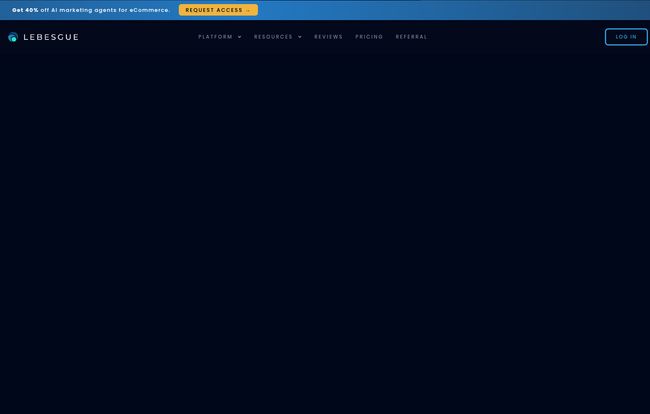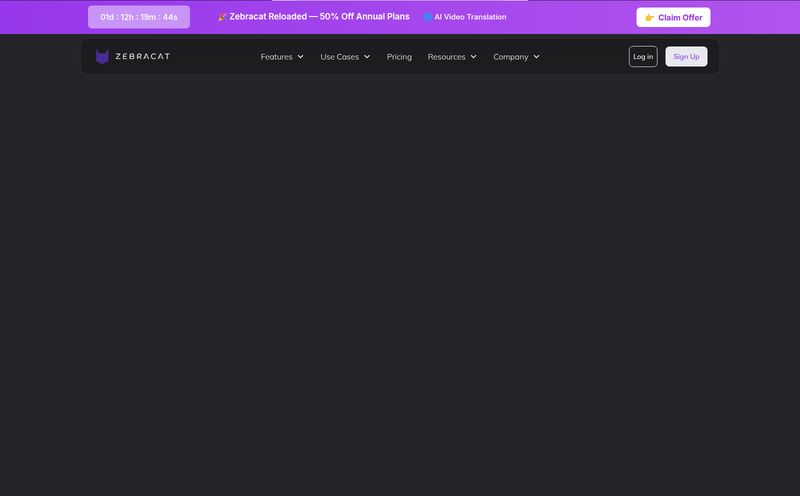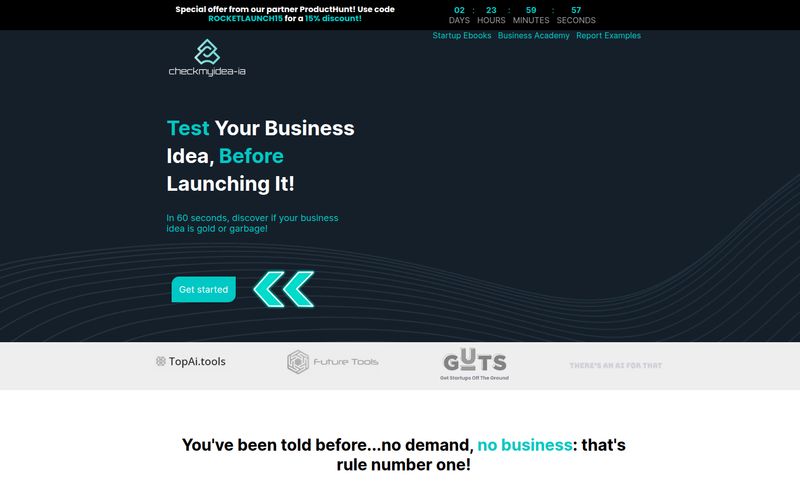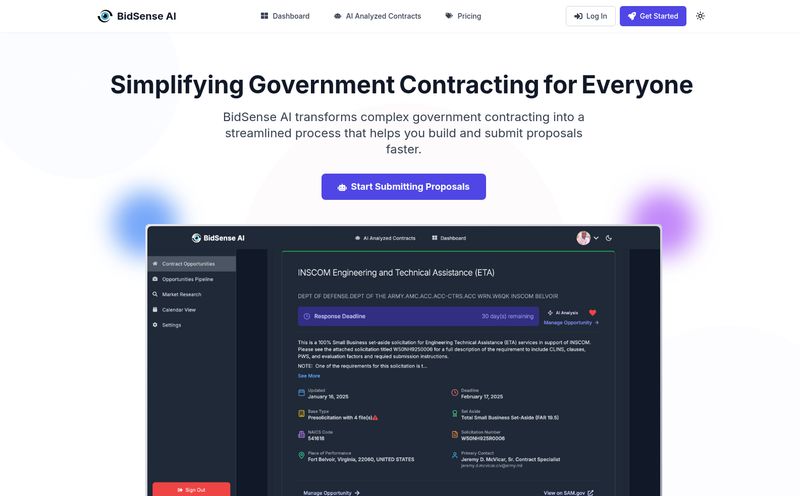Running an e-commerce brand is a bit like trying to fly a plane while building it. You’re juggling product sourcing, customer service, and the ever-hungry beast that is digital marketing. You've got a dozen tabs open: Shopify Analytics, Google Analytics, Facebook Ads Manager, TikTok… and none of them seem to agree on where your last sale actually came from. It's a mess.
I've been in those trenches. Staring at a spreadsheet at 2 AM, fueled by coffee and pure desperation, trying to figure out if my ROAS is a work of fiction. So when I hear about a tool that claims to be an “AI CMO,” my skepticism alarm goes off, but my curiosity gets the better of me. That's what happened with Lebesgue. It promises to bring AI-driven clarity to the chaos of e-commerce marketing. But does it deliver? I’ve spent some time kicking the tires, and here’s what I really think.
So What Exactly Is Lebesgue?
At its heart, Lebesgue is a centralized command center for your e-commerce marketing. Instead of being a simple dashboard that just mirrors data, it aims to be a strategist. It pulls in information from all your key platforms, analyzes it against wider market trends and your direct competitors, and then spits out actionable insights. Think of it less as a report and more as having a data scientist on your team who actually understands marketing.
It's built for Shopify store owners who are tired of guessing. Should you increase your ad spend? Are your new creatives working? Which products are your most valuable in the long run? These are the questions Lebesgue is designed to answer.

Visit Lebesgue: AI CMO
Diving Into The Core Features
A tool is only as good as what it can do. While Lebesgue has a ton of features, a few really stood out to me as game-changers for the average store owner. This is where the platform moves from being a 'nice-to-have' dashboard to a 'how-did-I-live-without-this' tool.
The All-in-One Dashboard for a Sanity Check
First thing's first: the main dashboard. It’s clean. It pulls your most important metrics—revenue, ad spend, profit, CPA, AOV—into one view. This isn’t revolutionary on its own, but the magic is in the context. It calculates your true profit by letting you add custom costs (like shipping and transaction fees), giving you a real North Star metric. For anyone just starting out, their Free plan offers this dashboard and a weekly report, which is frankly a no-brainer. It’s a huge step up from the native analytics you're used to.
Spying on Your Neighbors with Competitors Intelligence
Okay, this is where it gets fun. Lebesgue’s Ultimate plan gives you a window into your competitors' strategies. And I don’t just mean seeing their public-facing ads. It provides detailed advertising metrics, showing you their estimated spend, what's working for them, and where they are getting their traffic. It’s like having a secret mole in their marketing department. For anyone in a competitive niche, this information is pure gold. It helps you benchmark your own performance and find gaps in the market you can exploit.
The AI Creative Strategist and Copywriter
We’ve all been there. Staring at a blank screen, trying to come up with a fresh ad angle. Creative fatigue is real, and it kills campaigns. Lebesgue’s AI tools are surprisingly good at breaking through that block. The AI Copywriter analyzes top-performing ads in your niche and generates new ad copy for you. Is it going to win a Pulitzer? No. But it’s a fantastic starting point that gets you 80% of the way there, saving hours of brainstorming. The Creative Strategist goes a step further, offering data-backed ideas for your next campaign. Pretty neat.
Let's Talk About the Elephant in the Room: Attribution
Ever since Apple dropped the iOS 14 bomb, accurate ad tracking has been… well, a nightmare. Facebook says one thing, Google says another, and Shopify just shrugs. This is probably the single biggest headache for modern performance marketers. And this is where Lebesgue’s most powerful—and most expensive—feature comes in: Le Pixel.
This isn't just another analytics script. Le Pixel is a first-party data tracking solution. In simple terms, it tracks users on your site using your own data, making it far more resilient to the whims of Apple and Google. It provides different attribution models, allowing you to see which channels are truly influencing conversions, not just which one got the last click. Some people might argue that setting up server-side tracking manually is better, but honestly, who has time for that? For a store doing serious volume, the extra cost for Le Pixel could easily pay for itself by preventing you from cutting spend on a channel that’s actually working.
A Transparent Look at Lebesgue's Pricing
Pricing can make or break a tool, so let’s lay it all out. Lebesgue has a tiered structure that’s clearly designed to grow with your store.
| Plan | Price | Best For |
|---|---|---|
| Free | $0 /month | New and small stores wanting to centralize their key metrics and get basic automated audits. |
| Advanced | $59 /month | Growing stores ready to focus on LTV, product performance, and market benchmarks. |
| Ultimate | $79 /month | Scaling and large stores that need deep competitor intelligence and AI-powered creative tools. |
| Le Pixel | $249 /month | Stores that are serious about solving attribution and need reliable first-party data tracking. |
My take? The Free plan is a gift. Every new store owner should install it. The jump to Advanced at $59 is worthwhile once you're consistently running ads and need to understand customer loyalty. The Ultimate plan at $79 is a steal for the competitor insights alone. Le Pixel is a bigger investment, but for a 7-figure brand, solving the attribution problem is priceless.
The Good, The Not-So-Good, and My Honest Opinion
No tool is perfect. After playing around with Lebesgue, I have a pretty clear picture of its strengths and where it might fall short. On the plus side, the sheer amount of actionable information is incredible. It’s not just data; its data with a point. The personalized recommendations are genuinely helpful, and the intuitive way it presents complex information like LTV and market benchmarks is a huge win. The customer service, from what I've seen, is also top-notch.
On the other hand, there can be a bit of a learning curve. To really get the most out of it, you need to spend some time setting up your custom costs and actually acting on the insights. It’s not a magic button. The price for the higher tiers, especially Le Pixel, might be a bit steep for businesses that are just starting to scale. And it's a bit of a bummer that the Le Pixel attribution comes at such a premium, though I understand why—it's a seriously powerful feature.
So, Who Is This Really For?
In my opinion, Lebesgue hits a sweet spot. If you’re a solopreneur or a small e-commerce team feeling overwhelmed by data, the Free and Advanced plans are fantastic. They’ll help you make smarter, faster decisions without needing a degree in data science. If you’re a scaling brand or a marketing manager at a larger company, the Ultimate and Le Pixel plans are your ticket to outsmarting the competition and finally getting a handle on attribution. It’s for the doers who want to stop guessing and start growing with confidence.
Frequently Asked Questions
- Is Lebesgue better than just using Shopify Analytics?
- Yes, absolutely. Shopify Analytics is fine for a top-level view, but Lebesgue provides much deeper insights, integrates with your ad platforms, calculates true profit, and offers competitive analysis. They're in different leagues.
- How difficult is it to set up?
- It's surprisingly straightforward. You connect your Shopify store and your ad accounts with a few clicks. The platform guides you through the process. Setting up custom costs takes a few minutes, but it's worth the effort for accurate profit tracking.
- Is the Le Pixel plan really worth $249 a month?
- If your store is spending thousands (or tens of thousands) on ads each month, then yes, it very likely is. Inaccurate attribution means you're wasting ad spend. Fixing that problem can easily save you more than the cost of the plan. For smaller stores, it's probably overkill.
- Can I use Lebesgue if my store isn't on Shopify?
- Currently, Lebesgue is primarily built for and integrated with Shopify. While they have integrations with many platforms like Facebook, Google, and TikTok for ad data, the core e-commerce connection is optimized for Shopify.
- Does the AI Copywriter create ready-to-publish ads?
- It creates a very strong first draft. I'd always recommend adding your own brand voice and a human touch, but it's an incredible tool for overcoming writer's block and getting new ideas based on what's already working in the market.
Final Thoughts on Lebesgue
Look, the world of e-commerce tools is crowded. There are a million dashboards and analytics apps out there. But Lebesgue feels different. It’s more than a dashboard; it’s a strategist. It’s trying to solve the real, nagging problems that keep store owners up at night. The combination of deep analytics, competitor intelligence, and a real solution to the attribution crisis makes it a seriously compelling platform.
It’s not perfect, and it’s not a magic wand. You still have to do the work. But it gives you a much, much better map to follow. If you’re feeling lost in your data, I’d say giving their free plan a shot is one of the smartest decisions you could make this week.



